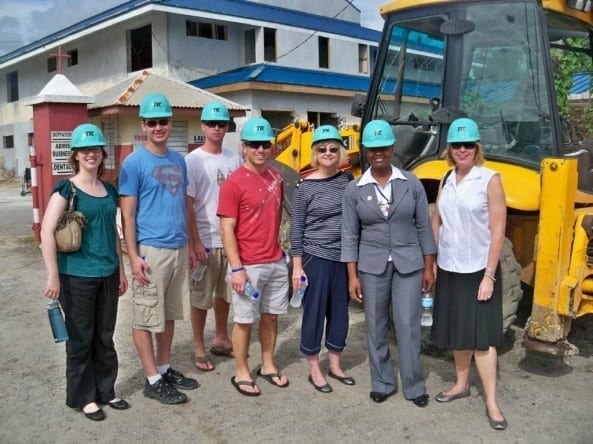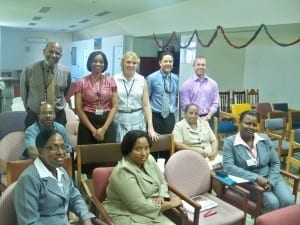
Last December, Kyle Kellum found himself talking with a group of nurses about how they could improve their hospital’s triage system. Meanwhile, Braden Ainsworth was dancing in front of a group of sixth-graders.

“It’s important that we provide more than hit-and-run global health,” says Mary Mincer Hansen, Ph.D., R.N., chair and program director of DMU’s master of public health program. “It’s also critical that we do what the local people and communities need and that it’s culturally appropriate.”
Toward those goals, the DMU group focused on three areas during their two-week stay: working with the island’s St. Jude’s Hospital staff on quality improvement across the organization and in its triage processes; providing continuing medical education to its mental health team; and, at the request of the nation’s health ministry, educating sixth-graders on healthy eating and exercise – hence, Ainsworth’s dance.

“I first met with a member of the health ministry who oversees nutrition. I prepared a presentation and hand-outs, which she liked,” says Ainsworth, a student in DMU’s public health program and a lab administrator at a hospital in St. George, UT. “I incorporated a game into my presentation, which I gave to three classrooms. I also did a little dancing to show how fun and easy it is to exercise.”
This was DMU’s third global health service trip to St. Lucia and the first to include a health care administration component. Kellum, a student in DMU’s master of health care administration program and director of diagnostic and therapy services at a hospital in Grangeville, ID, designed his capstone project for his degree on the request by St. Jude’s Hospital administrators for a quality assurance program.
“I had never done anything like that before, so it really took me out of my comfort zone,” he says. That led him to discover a critical aspect of global health service: Be flexible.
“I developed the plan and sent it to the hospital before we went. I didn’t receive much feedback,” he says. “Then when we got there, we met with the hospital leadership staff to listen to their needs. We scaled the project down to their triage system. That made it very productive.”
Kellum and Carla Stebbins, Ph.D., M.H.A.’93, chair and program director of DMU’s master of health care administration program, also gave the Myers-Briggs Type Indicator “personality inventory” to St. Jude’s management team to foster discussions about effective working relationships and leadership practices.
“The participants were totally engaged. We walked through how they could best make decisions using their knowledge of different personalities,” Stebbins says. “There seemed to be some lights that went on.”
That validated her hope that health care administration students and faculty could help enhance care delivery even in a different culture and in a relatively short time.
“To be brutally honest, I was unsure what impact we could have. Everything was very vague; we had only a rough sketch of what we could do,” she notes. “We needed to understand where their processes were and what they needed. Most of the hospital’s senior management staff has had little, if any, training in health care administration, so we focused on areas we could influence. We were thrilled to learn the powerful influence we could have.”
The DMU team also was impressed by the dedication and drive of the people they met, Stebbins adds.
“They love their country, their people and their heritage,” she says. “The professionals that we came in contact with demonstrated a work ethic and level of dedication that were very similar to that in the U.S. They do so much with the little they have.”
Ainsworth says the experience benefitted his career as well as the St. Lucians the DMU group helped.
“If there’s ever going to be a big change in health care, it’s going to come from health care administration and public health,” he adds. “That’s one of the things that attracted me to my career.”

